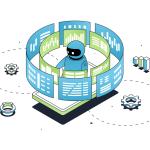Embracing sustainable business practices involves “walking the walk,” in the sense of demonstrating your commitment by your actions. But it also involves “talking the talk” – recognizing and using the terms that capture what those best practices are trying to achieve.
If you’re one of those small and medium-sized businesses that occasionally find themselves at a loss for words when it comes to the environment, however, you’re not alone.
According to a recent market research study, 42% of Canadians are confused by the terminology associated with sustainability. It’s understandable, given how much is going on to do away with our dependency on fossil fuels and protect our natural resources.
While concepts like recycling and composting are probably well-understood, consumers may not be completely up to speed on words like “biomass,” which represents a promising source of renewable energy.
They may buy “organic” food at the grocery store and know that it wasn’t grown through the use of harmful chemicals. The notion of sustainable packaging, on the other hand, could raise some eyebrows.
Businesses arguably have an even greater need to develop their environmental vocabulary along with adopting the right technologies. The actions they take can have an enormous impact on the planet’s future. Given that businesses are made up of people, of course, employees will take what they learn home and hopefully apply it in their everyday lives as well
There are plenty of environmental glossaries available online, but they don’t always look at the terminology through the lens of a business professional. The following is an attempt to do that, using a curated selection of terms based on some of the most common environmental priorities.
Active Transport
Although more organizations are moving to a hybrid work model, there are still plenty of gas-guzzling cars on the road as people go to offices or client sites. Active transport is a term used to describe more environmentally friendly ways of getting from A to B. These could include walking, cycling or even skateboarding. Encouraging employees to consider active transport can be a meaningful way for even the smallest businesses to act more sustainably.
Blue Economy
The earliest businesses exploited oceans and rivers to carry goods back and forth, or polluted waterways with their waste. A blue economy refers to the opposite approach, whereby efforts are made to restore or regenerate water systems that can provide so much value to many aspects of our entire ecosystem.
Carbon Accounting
More and more consumers are beginning to reassess their carbon footprint – the volume of carbon emissions they generate based on the way they use Earth’s natural resources. Businesses need to do the same thing, and carbon accounting refers to the process by which organizations track and analyze this data. While traditionally time-consuming and difficult to do, tools like Net Zero Cloud are making it as straightforward as managing customer data in a CRM.
Greenwashing
Customers, investors and other stakeholders are increasingly expecting businesses to show their leadership on environmental issues. They want real action, not just platitudes. “Greenwashing” refers to the latter – where a company uses marketing techniques to appear more focused on sustainability than it is in practice. If you get accused of greenwashing, you need ot provide proof you’re doing the real work.
Net Zero
When you’re struck a balance between emitting carbon and absorbing it, you can call your organization carbon neutral. That’s a great step in the right direction. Going the distance means aiming for net zero – where all greenhouse gasses being emitted into the atmosphere are equivalent to the greenhouse gasses being removed from the atmosphere. The terms are similar but net zero is a larger-scale effort that goes beyond carbon. This is important to remember as you set your sustainability targets.
Product Stewardship
It’s hard to believe, but at one time companies could almost take a stance of, “It’s not our fault about the environment – we’re just selling a product.” Today, it will be difficult to nurture long-term customer loyalty unless you embrace product stewardship. In other words, you not only make, market and sell items, but take responsibility for how they impact climate change and other environmental factors.
Science-based Targets
In 2015, countries around the world signed on to what’s now known as the Paris agreement, a treaty that covers climate change mitigation, adaptation and more. Rather than create sustainability strategies in a vacuum, science-based targets refer to the latest research that shows what actions will drive progress towards the Paris agreement’s milestones.
Triple Bottom Line
This term is already becoming more widely adopted by larger businesses, but SMBs can benefit from understanding it as well. It was coined almost 30 years ago and argues that companies should not just focus on their financial performance but how they affect society and the environment as well.
Zero Waste
We’ve been pouring garbage into landfills and burning refuse for so long it can seem like the only way to operate. Innovative approaches to recycling, reusing or reducing the materials business use are changing all that. Your company might not be at the “zero waste” mark today, but like all these terms, it’s a phrase you can use to talk about how you’re trying to evolve for a better tomorrow.





















